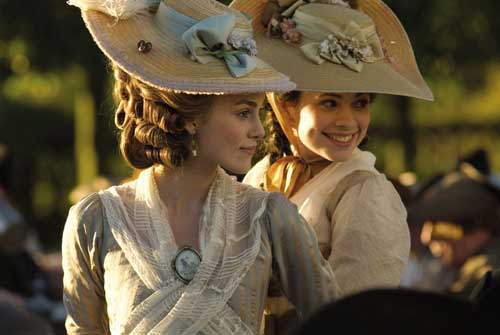The Duchess (12A)

Your support helps us to tell the story
From reproductive rights to climate change to Big Tech, The Independent is on the ground when the story is developing. Whether it's investigating the financials of Elon Musk's pro-Trump PAC or producing our latest documentary, 'The A Word', which shines a light on the American women fighting for reproductive rights, we know how important it is to parse out the facts from the messaging.
At such a critical moment in US history, we need reporters on the ground. Your donation allows us to keep sending journalists to speak to both sides of the story.
The Independent is trusted by Americans across the entire political spectrum. And unlike many other quality news outlets, we choose not to lock Americans out of our reporting and analysis with paywalls. We believe quality journalism should be available to everyone, paid for by those who can afford it.
Your support makes all the difference.There are few surprises in The Duchess, other than the director: Saul Dibb, who made punchy street drama Bullet Boy before going upmarket with the BBC's The Line of Beauty. In The Duchess, the sobriety of Dibb's approach makes for an intelligent addition to the historical canon: though perhaps here I, to use an appropriately 18th-century expression, damn with faint praise.
Based on the biography by Amanda Foreman, the film recounts the life of Georgiana, Duchess of Devonshire and great-great-great-great aunt of Princess Diana – a fact highlighted in trailers, but not at all in the film's account of a vivacious young beauty's marriage to an older, crusty potentate.
The comparison that The Duchess makes successfully, without undue stress, concerns Georgiana's place as a prototypical subject of celebrity culture: as London's most admired, her every move is recorded, although the period paps come armed with sketchbooks rather than long lenses. Given Georgiana's teetering haystack pompadours, you'd think she was Amy Winehouse's ancestor: there's actually an Amy moment in which a groggy Duchess collides with a blazing chandelier, prompting a powder-dry Ralph Fiennes to deliver the priceless line, "Please put out Her Grace's hair."
The Duchess is perceptive and serious-minded in its examination of the period's social structures and systems of sexual imprisonment. Fiennes is impeccably sardonic as the loveless, brutish Duke; a lofty Charlotte Rampling has a magnificent scene, pitching the hard sell on her daughter's marriageability; and Keira Knightley increasingly seems the star we've always been told she is. The gawky mannerisms still dominate, but she has some very good scenes, notably when Georgiana berates the Duke on discovering his adultery: rage tightly controlled and measured.
But The Duchess doesn't half drag in the second hour. The pacing might have worked better if the film had had the convictions of its true nature as a chamber drama of intimate confrontation, at its best at the breakfast table. But commercial necessity, no doubt, means that it is puffed out with extravagant crowd scenes, as when Georgiana's carriage dashes through the streets and all London throngs for a glimpse of Her Grace. Such blockbuster pomp feels superfluous, and only confirms the ultimately demeaning aspects of the costume genre, which would make peasants of us all, gawping at the fine gentlemen and ladies.
Join our commenting forum
Join thought-provoking conversations, follow other Independent readers and see their replies
0Comments